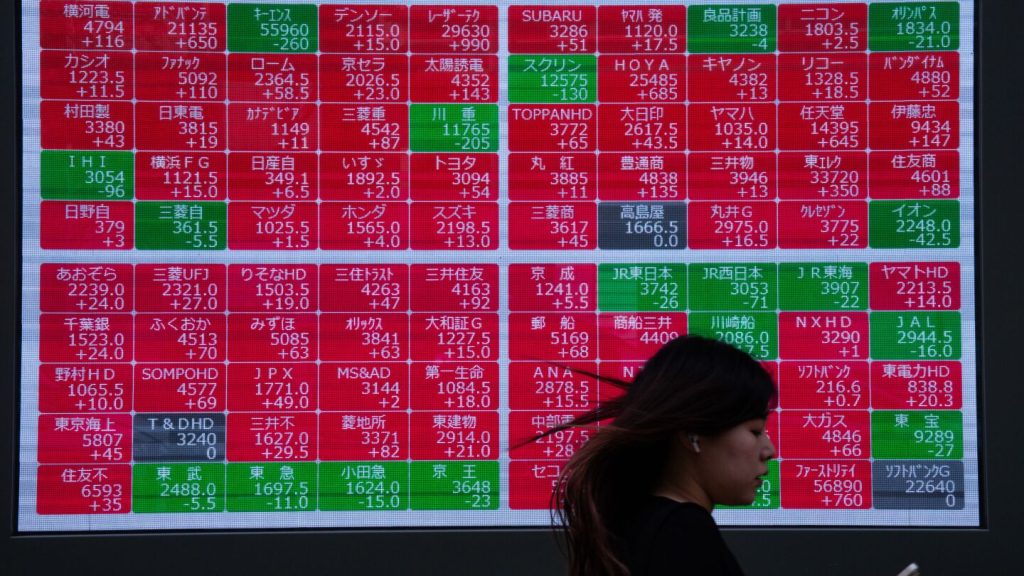Listen to the article
Asian markets surged Monday, with technology stocks leading the recovery after last week’s artificial intelligence-related selloff. The South Korean Kospi emerged as the standout performer, climbing 3.5% as semiconductor giants positioned in the AI sector posted substantial gains.
SK Hynix, which has established strategic partnerships with Nvidia on artificial intelligence technologies, saw its shares jump 5.5%. Market heavyweight Samsung Electronics followed with a 2.4% increase, contributing to the broader Korean market rally.
In Japan, the Nikkei 225 advanced 1.2% to 50,897.20, bolstered by strong performance in AI-related equities. Tokyo Electron, a key player in the semiconductor manufacturing equipment sector, stood out with a remarkable 4.7% surge as investors renewed their confidence in companies enabling AI infrastructure.
Other Asian markets similarly rebounded, with Hong Kong’s Hang Seng rising 0.8% to 26,445.65, while mainland China’s Shanghai Composite remained largely unchanged at 2,630.42. Australia’s S&P/ASX 200 climbed 0.7% to 8,826.50, and Taiwan’s Taiex jumped 1.2%. India’s Sensex gained a modest 0.5%.
The positive sentiment in Asian markets contrasted with the mixed performance on Wall Street last Friday, where major U.S. indexes closed their first negative week in four. The S&P 500 managed a slight 0.1% increase to 6,728.80, while the Dow Jones Industrial Average added 0.2% to 46,987.10. The technology-focused Nasdaq, which had fallen as much as 2.1% during the session, recovered significantly but still ended down 0.2% at 23,004.54.
U.S. markets experienced volatility throughout last week, weighed down by technology stocks with outsized market influence due to their substantial valuations. Alphabet, Google’s parent company, dropped 2.1%, while semiconductor firm Broadcom fell 1.7%.
Corporate earnings remain the primary focus for investors. Payment technology company Block, which operates Square and Cash App, saw its shares plummet 7.7% after reporting disappointing quarterly results. Conversely, exercise equipment manufacturer Peloton Interactive surged 14.2% following better-than-expected performance. Online travel platform Expedia Group posted one of the day’s strongest gains, jumping 17.5% after exceeding analysts’ forecasts.
Over 90% of S&P 500 companies have now reported their quarterly results, with most exceeding Wall Street expectations. According to FactSet data, the technology sector has demonstrated particularly robust growth, validating at least some of the premium valuations in the space.
Corporate earnings reports have taken on heightened significance amid the ongoing U.S. government shutdown—now the longest in history—which has delayed critical economic data releases. The absence of timely information on inflation and employment has created challenges for investors and Federal Reserve policymakers alike.
The lack of employment data is especially concerning as the job market has shown signs of weakening in recent months. The Federal Reserve has adopted a more cautious approach to interest rate cuts, balancing the need to stimulate economic growth against the risk of reigniting inflation, which remains stubbornly above the central bank’s 2% target.
Despite these challenges, market participants still largely anticipate the Fed will cut interest rates at its December meeting, though the magnitude of any reduction remains uncertain.
In commodity markets, oil prices strengthened early Monday, with U.S. benchmark crude adding 54 cents to reach $60.29 per barrel. Brent crude, the international standard, gained 49 cents to trade at $64.12 per barrel.
Currency markets showed modest movement, with the U.S. dollar rising slightly against the Japanese yen to 153.94, while the euro inched up marginally to $1.1564.
Fact Checker
Verify the accuracy of this article using The Disinformation Commission analysis and real-time sources.




6 Comments
The resilience of the South Korean and Japanese markets is noteworthy, particularly the strong performance of AI-enabling companies. Reflects the growing importance of this technology.
The varied performance across Asian markets highlights the complexity of the current economic landscape. It will be important to closely monitor trends in the semiconductor and AI industries.
Absolutely, the semiconductor and AI sectors are key indicators to watch. Their influence on broader market sentiment is significant.
Cautiously optimistic about the AI-related tech rebound, but concerned about potential volatility in the sector. Diversification remains crucial in this dynamic environment.
Interesting to see the AI-related tech stocks rebound after last week’s selloff. Semiconductors and AI manufacturing equipment seem to be leading the charge in Asia.
I’m curious to see how the AI sector will perform going forward. The strategic partnerships between chip makers and AI companies could drive further innovation and growth.